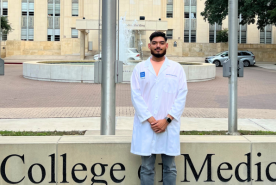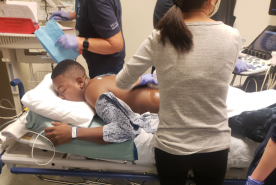Does someone in your family have high blood pressure? People with high blood pressure may need to make lifestyle changes, take special blood pressure medicine, or both. Knowing about high blood pressure and how it affects your family member will prepare you to help your loved one.
How can lifestyle changes help?
Making healthy lifestyle choices is an important part of treatment. It can help bring high blood pressure under control. This may include losing extra weight, eating meals with less fat and salt, limiting alcohol to no more than two drinks a day for men and one drink a day for woman, and starting a regular exercise program approved by a healthcare provider. If your family member is a smoker, your healthcare provider will advise him or her to stop. Smoking increases the risk of complications such as heart attacks or strokes.
Special blood pressure medicines may also be needed. There are many effective medicines for high blood pressure. Sometimes, a combination of different medicines may be needed. These medicines must be taken as instructed by your healthcare provider even if your family member is feeling fine. High blood pressure is damaging even when it causes no symptoms.
Should the whole family make lifestyle changes because one person has high blood pressure?
Many of the lifestyle changes advised for people with high blood pressure, such as following a healthier diet and starting an exercise program, are things we all should do as part of a healthy lifestyle. These changes can benefit the whole family.
What about family meals?
Reducing the amount of fat and salt can lower the risk of many diseases. It is also an important part of the treatment for high blood pressure. Fixing healthful meals for the whole family will save wear and tear on the cook who will not have to make separate foods for your family member with high blood pressure. It will also make it easier for him or her to follow the diet by eliminating some of the temptation to return to old habits.
The family member who does the meal planning and cooking should visit the dietitian along with the patient. Both can learn about the best foods to use and other helpful ideas to make following the diet easier. The healthcare provider can provide a referral to a registered dietitian, who will offer suggestions about eating the right foods in the right amounts to help control high blood pressure. The services of a registered dietitian may be covered by some health insurance policies.
What about exercise and family activities?
Getting regular exercise helps keep blood pressure under control. The benefits of exercise include feeling and looking better, reducing stress and having better overall health. Families can exercise together and enjoy these activities as part of their free time together. They can walk, swim, or ride a bicycle regardless of age or differing abilities. Joining a gym, bowling league or a softball team are other good ideas.
How does stopping smoking help?
Stopping smoking can be hard to do, especially if others in the family continue to smoke. Family members should consider stopping smoking together and using the money usually spent on cigarettes to buy something they can enjoy together. At today's high cigarette prices, it would not take long to save enough money for a bicycle, for example.
What if our family member who has high blood pressure does not take their medicine?
Families can be supportive, but the responsibility for taking medicines rests with the patient. Sometimes, patients may have difficulty remembering whether they took the medicines or not. Special pill boxes are available that have small compartments labeled with the days of the week, as well as times of the day. These allow your family member to check to make sure the pill was taken. Watches with alarms and beepers are also helpful.
Some of the main reasons patients give for not taking their medicines are:
- "I don't feel sick, so I really don't need these pills."
- "These pills don't really help. I don't feel any different now than I did before."
- "I feel worse when I take these pills. They give me headaches, make me feel tired, cause problems with my sex life. I'm not going to take them anymore."
- "I can't pay for these pills. They cost too much."
Regardless of the reason, failing to take medicine is dangerous. Blood pressure medicines should never be stopped abruptly. You should encourage your family member who has high blood pressure to discuss any questions or concerns about medicines with the healthcare provider. If there are problems with side effects, the healthcare provider may be able to prescribe a different medicine that works better for the patient.
Is high blood pressure hereditary? Are other family members likely to get it?
The exact causes of high blood pressure are not known. However, there is evidence that high blood pressure tends to run in families. That’s why everyone in the family should make healthy lifestyle choices, along with the family member. By doing so, family members help each other — and also help themselves. Family members should also have their blood pressure checked at least once a year.
See also in this A-Z guide:
- What Is High Blood Pressure?
- What Causes High Blood Pressure?
- How is High Blood Pressure Treated?
- High Blood Pressure and Kidney Disease in Children
If you would like more information, please contact us.
© 2015 National Kidney Foundation. All rights reserved. This material does not constitute medical advice. It is intended for informational purposes only. Please consult a physician for specific treatment recommendations.



















